‘Fulfilling a passion’
Through the trauma of warto a new life in Canada, Yoshiko de Forest always found joy, even in hardship
Advertisement
Read this article for free:
or
Already have an account? Log in here »
To continue reading, please subscribe:
Monthly Digital Subscription
$0 for the first 4 weeks*
- Enjoy unlimited reading on winnipegfreepress.com
- Read the E-Edition, our digital replica newspaper
- Access News Break, our award-winning app
- Play interactive puzzles
*No charge for 4 weeks then price increases to the regular rate of $19.00 plus GST every four weeks. Offer available to new and qualified returning subscribers only. Cancel any time.
Monthly Digital Subscription
$4.75/week*
- Enjoy unlimited reading on winnipegfreepress.com
- Read the E-Edition, our digital replica newspaper
- Access News Break, our award-winning app
- Play interactive puzzles
*Billed as $19 plus GST every four weeks. Cancel any time.
To continue reading, please subscribe:
Add Free Press access to your Brandon Sun subscription for only an additional
$1 for the first 4 weeks*
*Your next subscription payment will increase by $1.00 and you will be charged $16.99 plus GST for four weeks. After four weeks, your payment will increase to $23.99 plus GST every four weeks.
Read unlimited articles for free today:
or
Already have an account? Log in here »
Hey there, time traveller!
This article was published 20/08/2022 (1188 days ago), so information in it may no longer be current.
Yoshiko de Forest lived a life few in Canada could ever imagine.
She was born in Kyoto, Japan, in 1931 and spent part of her childhood in the city of Okayama. Her family had to flee to the countryside after surviving a firebomb attack during the Second World War.
“I think she knew at a young age that she had to get it together and be self-sufficient, and really work hard at everything she did,” Maya de Forest, her youngest child, says. “So she came with that here, and then she just worked hard at everything she did.”
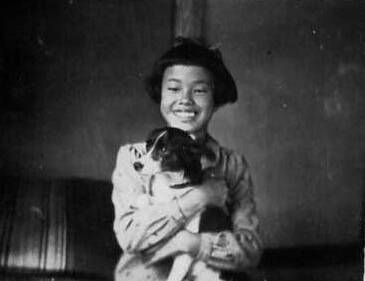
Supplied
A young Yoshiko with her dog, Ruri.
Yoshiko, who died on April 19 at 90, held a deep desire to be independent after experiencing the trauma of war. She began pharmacy school in Kobe, Japan, after high school, but was forced to return to Kyoto to help her mother keep her hotel business afloat.
Persistent, she finished a teaching certificate and began work at an elementary school.
At her mother’s inn, she met Claude de Forest, a Swiss-Canadian traveller. Yoshiko was his tour guide during his two-week stay, and they later exchanged love letters for two years; it was a “meeting out of a movie,” as their oldest child, Kevin de Forest, describes it. In 1960, the couple married in Japan and came to Canada to build a new life.
They first went to Vancouver, and then on to Winnipeg.
“That wasn’t done, actually, at the time in Japan — for somebody to leave. That island mentality was really, and it still is, present,” Kevin, 60, says. “But for my mom to up and leave and go to a completely different culture was a massive undertaking. That’s another thing about her… she was just so brave to have gone and done that.”
If it was hard, Yoshiko made it seem easy. She took to her new life with gusto. She became a stay-at-home mom in Old St. Vital and a master of many trades, from cooking to hosting to gardening. A lover of the written word, she studied English literature at Dakota Collegiate, and later taught Japanese there.
Her devotion to flamenco dancing was remarkable; she’d take multiple classes a week well into her 70s, film the classes, and practise along at home.
“She was fulfilling a passion, and that was really wonderful to see, because she put so much work, she put so much time into her children,” says her daughter Maya, 53. “So for her to finally be doing something for herself was just so wonderful to see.”
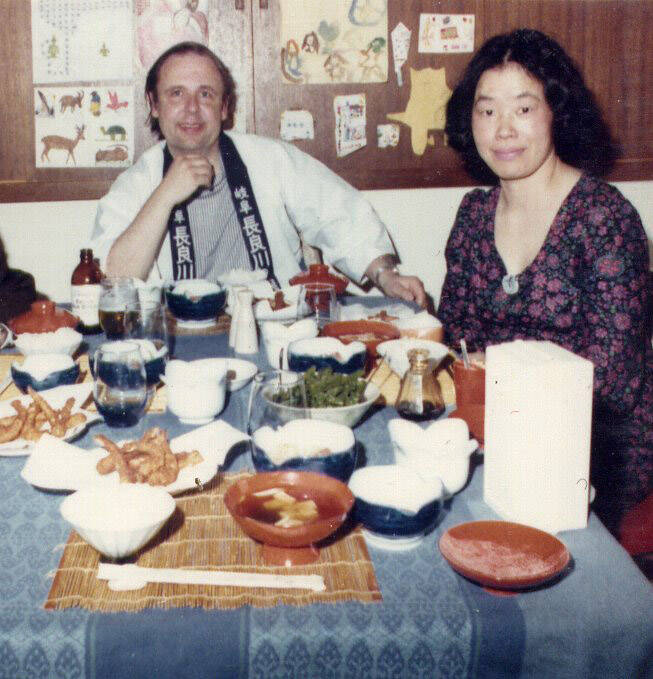
Supplied
Yoshiko and her husband, Claude de Forest, in 1970
She was stern with her children and spoiled her two dogs, Aurora and Hanako. Behind her no-nonsense parenting style was a deeply loving nature, middle child Leah de Forest says. Yoshiko had had a hard life, and she wanted her children to experience everything they could to the best of their ability.
“I think of my mom as being very strict and tough, but in fact, I think she was pretty liberal compared to other Japanese-Canadian parents,” Leah, 57, says. “I think she was very nurturing to us. She really wanted us to live a really full childhood.”
● ● ●
Canada wasn’t always the universally accepting melting pot it would bill itself as at the time. Yoshiko had a different life and different experiences than most of the other mothers her three children knew, and while she and Claude often found themselves in more progressive circles, she also found herself at the end of anti-Asian racism on more than one occasion, Kevin said.
“I would say she was a strong-willed pioneer, coming to Canada to be with her Swiss-born husband and raising a mixed-race family in the 1960s,” Kevin says.
She wasn’t willing to go in depth on the extent of it, he said, in part because of the desire she shared with many newcomers — to assimilate, to fully become part of the fabric of Canada.
“There’s no way that that was not part of her experience, but I think, in my mind, she just chose to overlook that and just embrace her identity as this new Canadian and suffer through that kind of racism,” Kevin said.
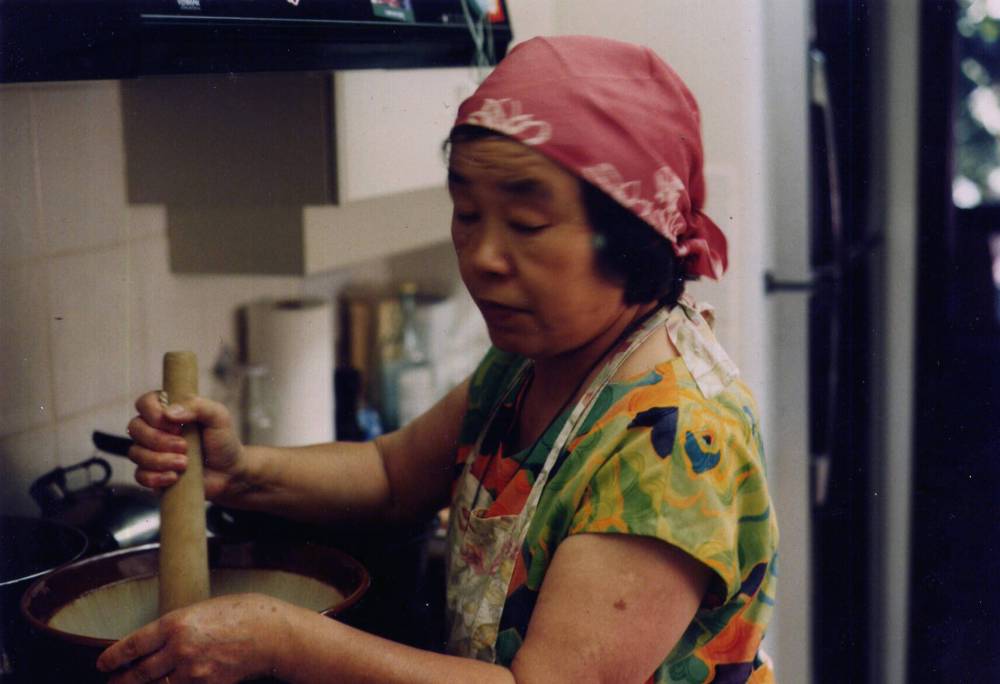
Supplied
Yoshiko in the kitchen.
When asked when her mother seemed happiest, Maya fondly remembers the regular visits to Japan her mother took in her 70s.
“She was just so full of wanting to do everything, she was just in her element, and just wanted to show us absolutely everything,” she says. “She had so much energy around it and was just so full of life.”
She’d often host lavish dinner parties featuring elaborate Japanese dishes, and became a helping hand and a connection for Japanese newcomers and other immigrants, who were comforted by her empathy and shared understanding of their struggles.
Leah laughs remembering a time when she was working as a museum employee. She was having trouble understanding a visitor who spoke Japanese and got her mom on the phone to speak with him.
“We ended up having him over for dinner,” she says. “That’s the kind of thing she would do… she just loved people.”
That’s who she was well into her later years — she loved to exercise and remained physically and mentally active. Even after she had a stroke at 77, months after getting double-knee surgery, she learned to walk and talk again.
Slowly, it became more difficult for Yoshiko to keep up her lifestyle. Claude died in 2013, and their three children had seen the world. But their ailing mother brought them back together — Maya moved home to take care of Yoshiko in 2009; Leah in 2016. Kevin remained close by in Brandon. The goal, Maya said, was to keep her at home for as long as possible.
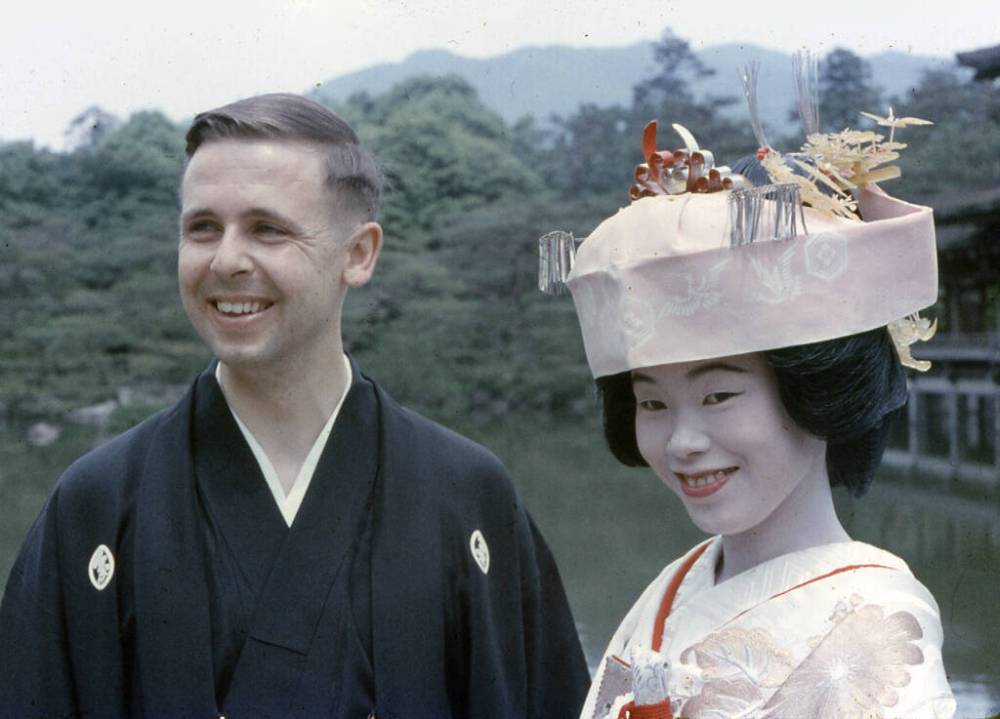
Supplied
Yoshiko and Claude were married in Japan in 1960.
“I did really want to help her and spend time with her, you know? She was such a giving person, she just didn’t deserve that,” Maya says.
In the fall of 2019, at 88, she moved to the Saul and Claribel Simkin Centre personal care home. It’s a painful memory for her children, especially considering the timing — six months later, it would be closed to visitors and family for months.
”I think, sadly, COVID just made the last few years harder to accept, just the way she declined… it was really like torture for all of us,” Maya says.
Nevertheless, they kept contact any way they could, and made sure Yoshiko had access to her comforts — sumo wrestling matches on television, Japanese cuisine brought in when it was allowed.
“Her life was really hard in some ways, and we just wanted to make sure that at the end, she was feeling really supported and could have as positive of life experiences as she could,” Leah says.
She died less than three years after entering the care home, but lives on through the work of her children — Maya published a photobook profiling her mother in 2007. A body of paintings created by Kevin in 2019 focused on portraits of his parents.
Leah wrote of her mother’s experience in a care home during COVID-19 for CBC News in 2020, advocating for higher standards of protection and quality of life care for seniors in Manitoba.
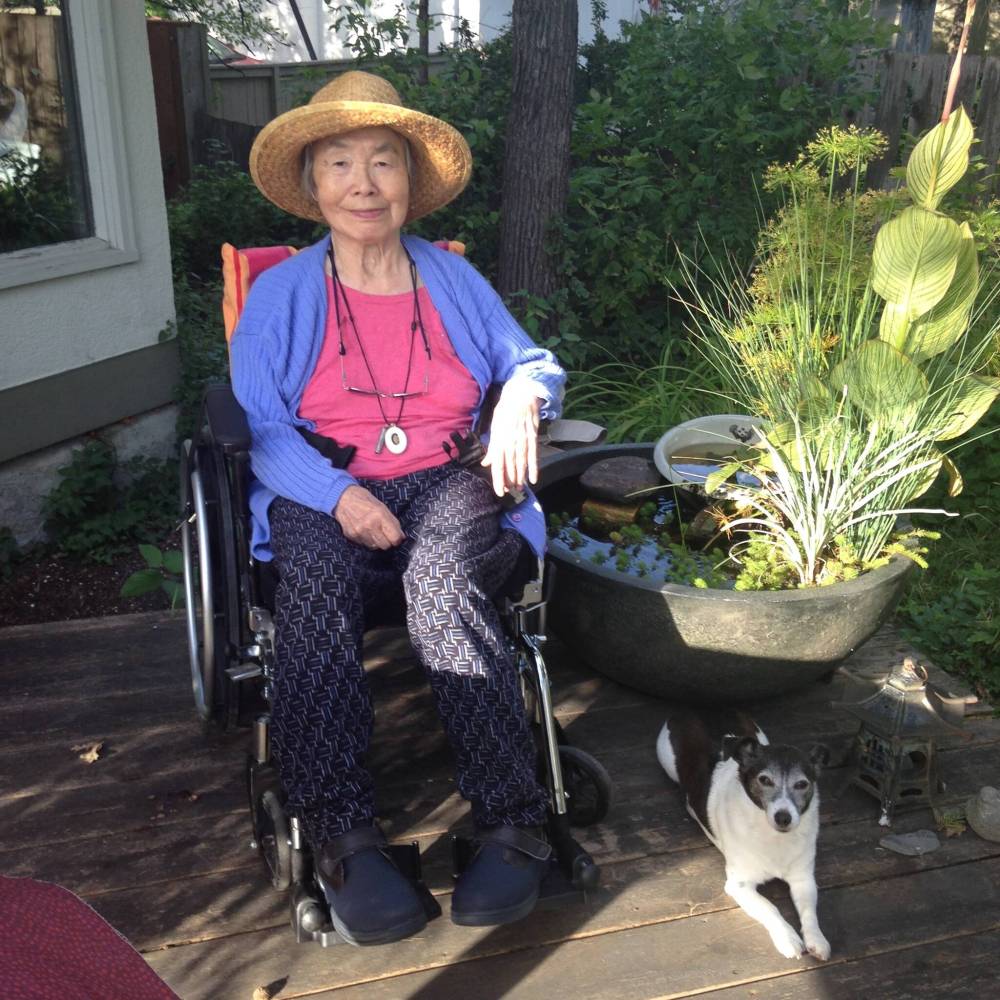
Supplied
Yoshiko de Forest, a wife and mother who raised her family in Old St. Vital, died in April at the age of 90.
She lives on in her laugh, too — one so unique that all three children bring it up when remembering their mother.
“I have these really hilarious pictures, a couple of pictures of her just in full laugh — she just had this incredible laugh where everybody commented on it,” Leah says.
“She just had so much joy, even though she had all these hardships.”
malak.abas@freepress.mb.ca

Malak Abas is a city reporter at the Free Press. Born and raised in Winnipeg’s North End, she led the campus paper at the University of Manitoba before joining the Free Press in 2020. Read more about Malak.
Every piece of reporting Malak produces is reviewed by an editing team before it is posted online or published in print — part of the Free Press‘s tradition, since 1872, of producing reliable independent journalism. Read more about Free Press’s history and mandate, and learn how our newsroom operates.
Our newsroom depends on a growing audience of readers to power our journalism. If you are not a paid reader, please consider becoming a subscriber.
Our newsroom depends on its audience of readers to power our journalism. Thank you for your support.

